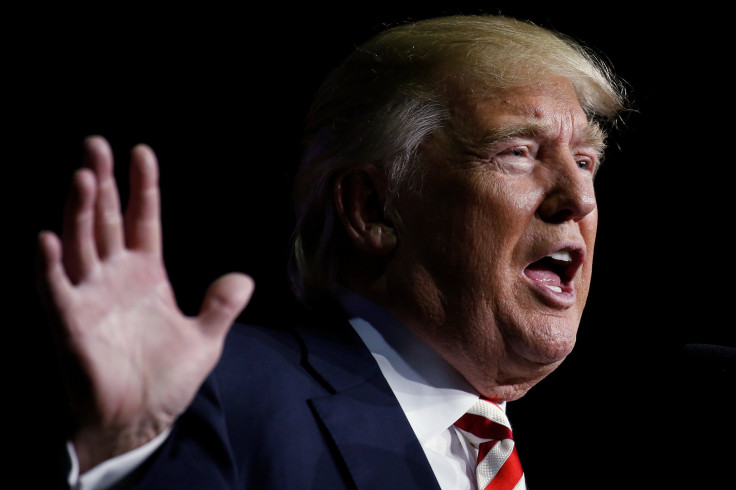4 Times Donald Trump Tried To Reach Out To Black Voters; GOP Nominee To Visit African American Church

Donald Trump is making his most direct plea to black voters yet.
With just more than two months left until the general election, the GOP presidential nominee is seemingly desperate to increase his appeal to African Americans. On Saturday, Trump will visit Great Faith Ministries International, a black church in Detroit, where he is expected to tape an interview with a pastor to be released next week and speak briefly with the congregation. However, reports of how scripted the visit will be underscores how poorly Trump's outreach to black voters has been to this point.
Just a few weeks ago the businessman was polling at zero percent among likely black voters — the combination of a checkered past on the issue of race in his private life and a series of clumsy attempts to reach out to black voters during his campaign. It seems near impossible for Trump to win the black vote away from Democratic nominee Hillary Clinton, it will be hard for him to win the White House without securing at least a portion of African-American voters.
Here is a recap of Trump's outreach to black voters so far:
Trump's Advisers
Trump has been largely criticized for the lack of diversity among his largely white, male campaign staff and advisers — members of his recently assembled council of Hispanic advisers are even bailing now as a result of Trump's speech Wednesday in Arizona on immigration. However, Trump has courted a few black voices to his campaign.
Former presidential candidate Dr. Ben Carson, a retired neurosurgeon who has harshly criticized Black Lives Matter and Democratic policies regarding African-Americans, is a surrogate of the Trump campaign, appearing on news shows regularly to defend the candidate. Theresa Manigault, better known as Omarosa, a former contestant on Trump's reality show "The Apprentice," was named the Trump campaign's director of African-American outreach. Other notable black Trump supporters include, Milwaukee Sheriff David Clarke and boxer Mike Tyson — Tyson is a longtime friend of Trump's. None has done much to curry favor with black voters.
"My African American"
One knock against Trump is that the crowds at his massive campaign rallies are normally nearly all white, with the exception of frequent protestors who have at times been treated violently by Trump's supporters. During a June campaign rally in Redding, California, Trump sought to disprove the idea that his appeal only extended to white Americans by singling out an apparent black supporter in the crowd.
"Oh, look at my African-American over here!" Trump said, interrupting his speech to point to the man in the crowd. "Look at him. Are you the greatest? You know what I'm talking about, OK?"
Trump came under fire for suggesting that man's presence constituted his support, let alone wide ranging support from the black community. The man in question, Gregory Cheadle, a Republican candidate in California's first congressional district, said he took the attention from Trump as a compliment, but noted he could not yet consider himself one of the candidate's supporters.
"What The Hell Do You Have To Lose?"
In late August, Trump made his most direct appeal to African-American voters during a speech in Michigan.
"Tonight, I am asking for the vote of every African-American citizen in this country who wants a better future," Trump said. "Look at how much African-American communities have suffered under Democratic control. To those hurting, I say: what do you have to lose by trying something new? I say it again, what do you have to lose? Look, what do you have to lose? You're living in poverty, your schools are no good, you have no jobs. 58 percent of your youth is unemployed. What the hell do you have to lose?"
Trump was blasted for the generalization that all African-Americans are living in economic despair or in neighborhoods riddled with crime. The optics of the speech were also ironic — Trump's crowd in Michigan was nearly all white and the GOP nominee had previously turned down invitations to speak to the NAACP and National Association of Black Journalists. Critics argue the true intention of the speech — elements of which Trump has repeated on the campaign trail — was to appease on-the-fence white voters uncomfortable with the allegations of racism against the Trump campaign.
Dwyane Wade
Last week, the cousin of NBA star Dwyane Wade was shot and killed while walking her baby in Chicago. Trump took to Twitter to speak out, but instead of expressing sympathy, used the tragedy to argue that his law and order approach to crime is necessary and would be beneficial to black voters in inner-cities.
Critics attacked Trump for the insensitivity. Wade, whose first name was spelled wrong in Trump's tweet, said he was grateful that Trump helped expand the conversation about gun violence in Chicago, but that the tweet "left a bad taste in his mouth."
© Copyright IBTimes 2024. All rights reserved.






















